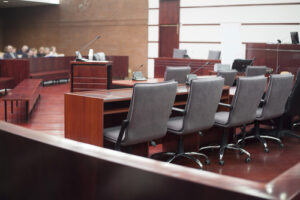 When a trial is not completed successfully, there is said to have been a “mistrial.” The trial is terminated rather than concluded, and the entire process that occurred is declared void. A mistrial occurs at some point in a trial before the judge or a jury returns a decision. A mistrial can be asked for by either side at any point in the proceedings.
When a trial is not completed successfully, there is said to have been a “mistrial.” The trial is terminated rather than concluded, and the entire process that occurred is declared void. A mistrial occurs at some point in a trial before the judge or a jury returns a decision. A mistrial can be asked for by either side at any point in the proceedings.
A mistrial can occur when:
When a judge formally declares a mistrial, the proceedings are stopped immediately. The defendant is not convicted, but nor are they acquitted. When a mistrial is declared, the prosecution has two options: Drop the charges or retry the case. In some instances, a judge may disallow a prosecutor to retry the case but this is not typical. In almost all instances, a prosecutor is given permission to move ahead if they move for a new trial.
There is some question as to whether retrying a case after a mistrial has been declared is unconstitutional. The thought behind this is that double jeopardy should come into play. In other words, a person cannot be tried for the same charges twice. So far, the Supreme Court has held that a retrial does not invoke double jeopardy and is therefor permissible under current constitutional law.
While mistrials do not occur often, they do happen. An experienced criminal defense attorney will stay aware during a proceeding, looking for evidence of juror misbehavior, testimony that prejudices a judge or jury, or other factors that may enforce a mistrial ruling. It is important that criminal defendants are aware that mistrials do not occur in real life as often as they are depicted on television. Most attorneys are very careful to follow the letter of the law during a trial in order to avoid the expense related to having to try a case for a second time.
If you have been charged with a crime in Orlando, you need an experienced criminal defense attorney fighting by your side. Call our team today to schedule an appointment for a free case evaluation. We will review the details of your charges and arrest and advise you of the options available to you under current state law.
509 W Colonial Dr. Orlando, FL 32804
Law Office Directions
Free Consultation(321) 332-0430
Contact the Law Offices of Katz & Phillips today to speak with one of our attorneys about your case today by filling out the form below, or call us at (321) 332-0430.
"*" indicates required fields